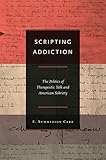Scripting Addiction : The Politics of Therapeutic Talk and American Sobriety / E. Summerson Carr.
Material type: TextPublisher: Princeton, NJ : Princeton University Press, [2010]Copyright date: ©2011Edition: Course BookDescription: 1 online resource (336 p.) : 2 halftones. 11 line illus. 2 tablesContent type:
TextPublisher: Princeton, NJ : Princeton University Press, [2010]Copyright date: ©2011Edition: Course BookDescription: 1 online resource (336 p.) : 2 halftones. 11 line illus. 2 tablesContent type: - 9780691144504
- 9781400836659
- Anthropology, Cultural -- methods -- United States
- Communication and culture
- Communication -- United States
- Culture -- Semiotic models
- Culture -- Semiotic models
- Drug abuse -- Treatment
- Drug abuse -- Treatment
- Language and culture
- Language -- United States
- Medical anthropology
- SELF-HELP -- Substance Abuse & -- Addictions -- General
- SOCIAL SCIENCE -- Anthropology -- Cultural
- Substance-Related Disorders -- therapy -- United States
- addiction -- femme -- sans-logis -- Etats-Unis
- addiction -- interaction verbale -- relation psychothérapeute-patient -- Etats-Unis
- SOCIAL SCIENCE / Anthropology / Cultural & Social
- 362.29 22
- GN296 .C37 2011eb
- online - DeGruyter
- Issued also in print.
| Item type | Current library | Call number | URL | Status | Notes | Barcode | |
|---|---|---|---|---|---|---|---|
 eBook
eBook
|
Biblioteca "Angelicum" Pont. Univ. S.Tommaso d'Aquino Nuvola online | online - DeGruyter (Browse shelf(Opens below)) | Online access | Not for loan (Accesso limitato) | Accesso per gli utenti autorizzati / Access for authorized users | (dgr)9781400836659 |
Browsing Biblioteca "Angelicum" Pont. Univ. S.Tommaso d'Aquino shelves, Shelving location: Nuvola online Close shelf browser (Hides shelf browser)

|

|

|

|

|

|

|
||
| online - DeGruyter Noir Urbanisms : Dystopic Images of the Modern City / | online - DeGruyter Reforming the World : The Creation of America's Moral Empire / | online - DeGruyter Not in the Heavens : The Tradition of Jewish Secular Thought / | online - DeGruyter Scripting Addiction : The Politics of Therapeutic Talk and American Sobriety / | online - DeGruyter Why People Cooperate : The Role of Social Motivations / | online - DeGruyter Group Problem Solving / | online - DeGruyter Winning : Reflections on an American Obsession / |
Frontmatter -- Contents -- Illustrations -- Acknowledgments -- Introduction. Considering the Politics of Therapeutic Language -- CHAPTER ONE. Identifying Icons and the Policies of Personhood -- CHAPTER TWO. Taking Them In and Talking It Out -- CHAPTER THREE. Clinographies of Addiction -- CHAPTER FOUR. Addicted Indexes and Metalinguistic Fixes -- CHAPTER FIVE. Therapeutic Scenes on an Administrative Stage -- CHAPTER SIX. Flipping the Script -- Conclusion -- Notes -- References -- Index
restricted access online access with authorization star
http://purl.org/coar/access_right/c_16ec
Scripting Addiction takes readers into the highly ritualized world of mainstream American addiction treatment. It is a world where clinical practitioners evaluate how drug users speak about themselves and their problems, and where the ideal of "healthy" talk is explicitly promoted, carefully monitored, and identified as the primary sign of therapeutic progress. The book explores the puzzling question: why do addiction counselors dedicate themselves to reconciling drug users' relationship to language in order to reconfigure their relationship to drugs? To answer this question, anthropologist Summerson Carr traces the charged interactions between counselors, clients, and case managers at "Fresh Beginnings," an addiction treatment program for homeless women in the midwestern United States. She shows that shelter, food, and even the custody of children hang in the balance of everyday therapeutic exchanges, such as clinical assessments, individual therapy sessions, and self-help meetings. Acutely aware of the high stakes of self-representation, experienced clients analyze and learn to effectively perform prescribed ways of speaking, a mimetic practice they call "flipping the script." As a clinical ethnography, Scripting Addiction examines how decades of clinical theorizing about addiction, language, self-knowledge, and sobriety is manifested in interactions between counselors and clients. As an ethnography of the contemporary United States, the book demonstrates the complex cultural roots of the powerful clinical ideas that shape therapeutic transactions--and by extension administrative routines and institutional dynamics--at sites such as "Fresh Beginnings."
Issued also in print.
Mode of access: Internet via World Wide Web.
In English.
Description based on online resource; title from PDF title page (publisher's Web site, viewed 29. Jul 2021)


